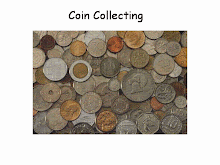By [http://www.articlesengine.com/Author/Edwin-Sproat/17958/1] Edwin Sproat
There are many factors affecting the price of a collectible coin. One concerns the level of demand and supply. If the supply is greater than the demand, the price will go down. However, if the demand is high but supply is low, the price shoots up.
Aside from being a hobby, collecting coins is also a business. The investors, collectors, and dealers influenced the demand for the coins. However, the dealers are the most influential of the three. They make their earnings by selling the pieces they acquired higher than what they initially paid for them.
The level of prices also varies depending on the parties involved in the transaction. If the dealers are doing business with coin enthusiasts or investors, they use the retail prices. However, if they face fellow dealers, they offer wholesale prices. Coin aficionados can always conduct their own research regarding the approximate prices of the coins they have. They can compare their findings of the rare coin values with what the dealers offer and discuss disputes. They can also refer to the published prices, which indicate the different levels of prices available to interested parties.
Often, dealers would pay less than the wholesale value of a coin in order to make profit. This is not advantageous for collectors and investors who decide to sell some of their coins. They would not be able to maximize the return of their investment. While they have the option not to do business with dealers, finding someone who is willing to purchase the coins they have is difficult.
On the contrary, there are benefits of purchasing coins from dealers. These are:
1. Highly regarded coin dealers can provide certificate of authenticity for the coin they sell.
2. They can give you sensible assessments of the possible grade of the coins you have.
3. You can also acquire information from them regarding possible problems that you may have overlooked. They are familiar with the different issues arising from coin condition. Their experience enables them to spot problems that others might have missed.
Other factors affecting coin value include grade and rarity. The grade is the most important factor when pricing newer coins. What is their current condition? Are their bent edges or scratches? However, this is not always the case. When pricing old coins, the date is more important. When were they minted and how many of those were produced? If it is a very rare coin, there is greater possibility that the price is also higher.
It is best if you consult the experts if you really want to know the value of your coins. There are experts in terms of grading coins. Often, dealers would do free appraisal of your coins if you were selling them. In addition, there are also paid services for grading coins. Although will shell out a few bucks, you can be certain of the accuracy of the value of your collectibles.
The most important thing is to study the market. Find out where you can sell your coin for utmost returns. See to it that you are knowledgeable about your collections as well. Find out how much it is priced so that you can negotiate reasonably.
Article Source: [http://www.articlesengine.com/Article/How-to-Price-Coins/323729/1]Articles Engine
Coin Collection 1879- 1923 Dollars
16 years ago










No comments:
Post a Comment